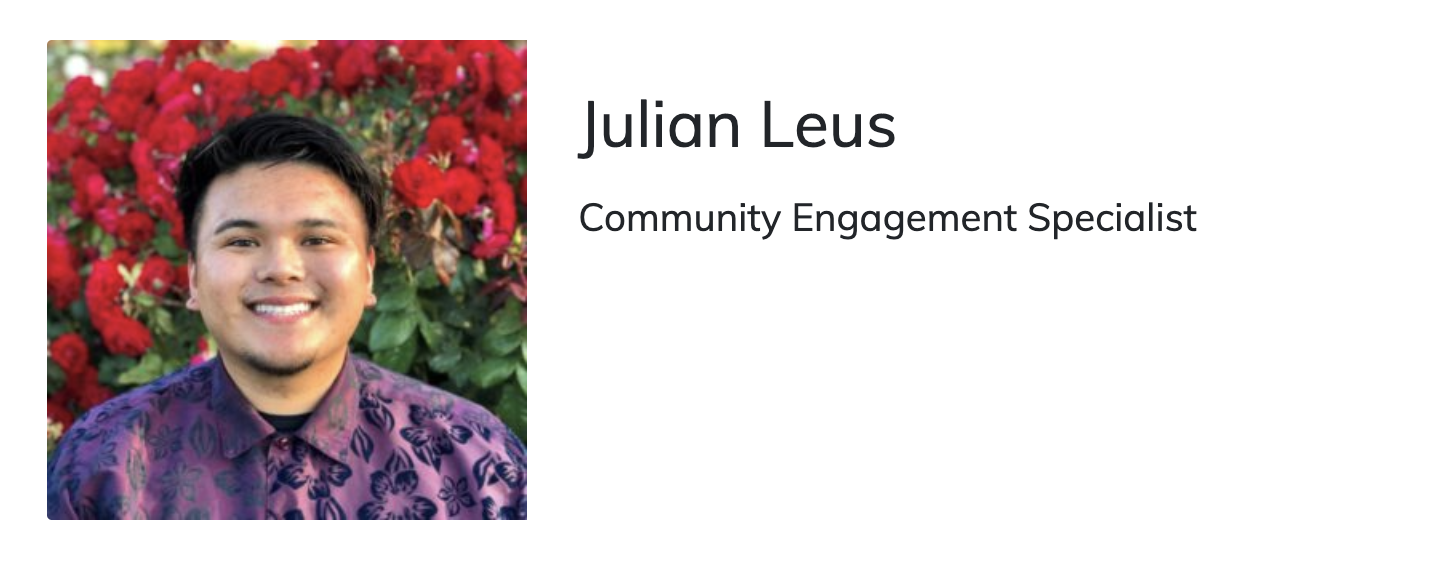Q&A with Julian Leus, Community Engagement Specialist at Family Caregiver Alliance
As FCA’s new Community Engagement Specialist, Julian Leus works with social service, health care and provider organizations that support family caregivers and local communities. In this Q&A, Julian shares some insights from working with family caregivers, offers tips to providers who may have caregiver clients or patients, and describes the free in-service sessions we offer to local organizations. Read Julian’s full bio here.

When did you join FCA and what do you do as a Community Engagement Specialist?
I joined FCA in October of 2021. In a broad sense, my role is to get the word out about FCA and our services. My primary focus is community education and partnership work—where I connect with local organizations (in the SF Bay Area’s six counties) that serve family caregivers. These organizations might serve caregivers directly or indirectly, and they range from health care providers/systems and county health departments to various non-profit social service organizations. Some of the organizations serve a specific population, such as seniors with disabilities, LGBTQIA folks, or faith-based communities, or they may focus on unique issues relating to our various BIPOC (short for “Black, Indigenous and People of Color”) communities. These organizations can then tap FCA as an additional layer of support for their caregiver clients. Working together, we’re able to ensure that more caregivers get the resources and services they need.
What do you like about your work at FCA?
The Bay Area is home to so many different cultures—of race/ethnicity, class, gender identity, sexual orientation—and I love working with family caregivers from such a range of diverse communities. It’s rewarding to be able to help those navigating care for adults living with complex health issues, including cognitive impairments. I also love the staff here—our team is relatively small but very diverse, and everyone brings different skills, expertise and lived experience to our mission of helping family caregivers and their care recipients.
Are you noticing any common challenges local caregiver communities face, especially those of color, low-income, or diverse languages?
There are varying issues that minority communities face, and many of them surface at the intersection of living as a BIPOC person who is experiencing the constraints of low-income status. Lack of resources can really affect the care they provide to their care recipient, as well as their capacity to tend to their own well-being. Additionally, some family caregivers might not speak fluent English or have anyone in their social circle who does, and that can sometimes contribute to a general mistrust in seeking help from social services agencies. At FCA, four of our family consultants are multilingual and ready to help in Spanish, Tagalog, and Mandarin and Cantonese. I often partner with them to provide strategic and culturally sensitive education for BIPOC-focused organizations about eligibility for and access to FCA services. Another issue facing some of these communities is that there can be a taboo or stigma around asking for help. So, part of our work in the social services space is to destigmatize help-seeking.
What are organizations surprised to learn about FCA?
First, that we exist! (laughter). But in all seriousness, I think that human-services organizations like ours are often so busy serving clients that sometimes it’s hard to make the time to research and connect with others in the provider network. Second, these organizations are usually surprised (and happy!) to hear that we focus primarily on family caregivers of those living with physical and cognitive impairments such as Alzheimer’s disease and other dementias. Finally, it’s usually news to them that we offer services free of charge and that we have resources in multiple languages such as Spanish, Tagalog, traditional Chinese and Vietnamese.
Is there anything you’d like to share with those organizations or social service/health care providers?
One thing I hear consistently from family caregivers is that they don’t consider themselves caregivers. Instead, they see their daily caregiving tasks as “just a part of life.” But when we help them see the value of those tasks—after all, “caregiver” is a paid job in health care—they may more clearly recognize signs of stress and the need for support. So, I’d say it’s important to help them recognize their own contributions and the state of their well-being. The next step is to encourage them to seek help, whether it’s for mental health, caregiving resources or another type of support. Let them know there are free non-profit services that can help—and encourage them to reach out.
How can organizations connect with you and work with FCA?
Providers and organizations can email me anytime at jleus@caregiver.org or call me at (415) 634-7633. I’m happy to answer questions, provide info and help with their efforts to better serve family caregivers. Also, my colleagues and I offer free in-service presentations for providers and their organizations. These are educational sessions (typically an hour via zoom) for internal staff, covering the range of FCA’s programs, direct services, and eligibility requirements. We can tailor the in-service to each organization’s unique needs of their focused client/patient population, whether that’s dementia care basics, services in a specific language, caregiver stress management, or something else. Ultimately, our goal is to help them help more caregivers.
